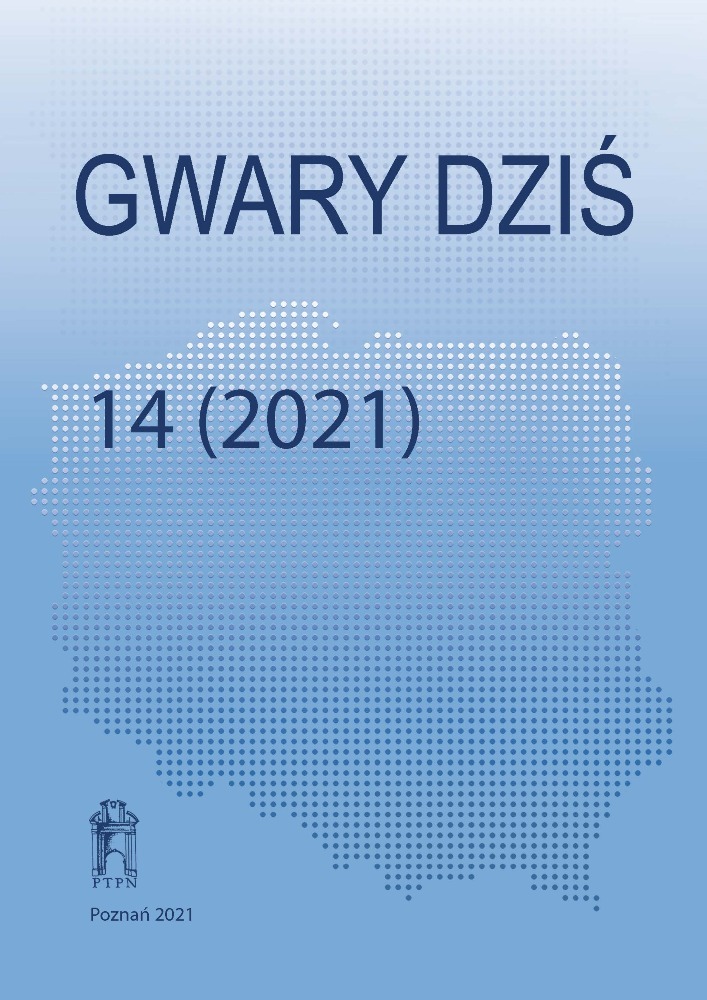Abstract
The recent civilization and culture-related transformations in rural areas have created a need for interdisciplinary research that will capture the essence of these changes and will characterize them. To date, research has focused on the spoken language as the primary form of communication of villagers; they make use of written texts mainly to communicate with public administration institutions. Therefore, these texts pose a unique opportunity to gain insight into the linguistic competence of villagers related to communication, text-forming, and style, as well as their persuasion strategies. These documents also show the extent to which a local dialect is reflected in written texts. The value of these records has been confirmed by a study of documents submitted to social assistance centres in Lesser Poland. An analysis of the language material from other areas would allow to draw more general conclusions concerning the official language of villagers.
References
Bartmiński J. (1991), Odmiany a style języka, [w:] Wariancja w języku. III Opolskie Spotkania Językoznawcze, Szczedrzyk 10–11.10.1989 r., red. S. Gajda, Opole, s. 11–16.
Cygan S. (2011), Przejawy świadomości językowej mieszkańców wsi końca XX wieku na przykładzie Lasocina na Kielecczyźnie, Kielce.
Cząstka B., Synowiec H. (1987), Cechy języka uczniów szkół śląskich w sytuacji lekcyjnej, „Socjolingwistyka”, nr 7, s. 117–131.
Dunaj B. (1994), Kategoria oficjalności, [w:] Współczesna polszczyzna mówiona w odmianie opracowanej (oficjalnej), red. Z. Kurzowa, W. Śliwiński, Kraków, s. 23–31.
Kąś J. (1994), O piekielnickiyk słowak obraźliwyk, „Etnolingwistyka”, nr 6, s. 175–187.
Kucała M. (1994), Gwara, [w:] Encyklopedia języka polskiego, red. S. Urbańczyk, Wrocław, s. 105.
Kurek H. (2010), Przemiany kulturowo-językowego wizerunku polskiej wsi w ostatnim półwieczu (na przykładzie gwar małopolskich), Studia Dialektologiczne IV, red. H. Kurek, A. Tyrpa, J. Wronicz, Kraków, s. 71–79.
Labocha J. (2002), Tekst gwarowy jako dyskurs, Studia Dialektologiczne II, red. J. Okoniowa, B. Dunaj, Kraków, s. 47–52.
Labocha J. (2004), Tekst pisany – tekst zapisany, „Biuletyn PTJ” LX, s. 5–10.
Ong W.J. (2011), Oralność i piśmienność. Słowo poddane technologii, przeł. J. Japola, Warszawa.
Ożóg K. (2001), Polszczyzna przełomu XX i XXI wieku. Wybrane zagadnienia, Rzeszów.
Pelcowa H. (2001), Metodologia badań leksyki gwarowej u schyłku XX wieku, [w:] Gwary dziś, t. 1. Metodologia badań, red. J. Sierociuk, Poznań, s. 193–189.
Pelcowa H. (2010), Specyfika i tożsamość gwarowa regionu, Studia Dialektologiczne IV, red. H. Kurek, A. Tyrpa, J. Wronicz, Kraków, s. 63–70.
Piechnik A. (2016), Język pism kierowanych przez mieszkańców okolic Zakliczyna do instytucji gminnych, „Socjolingwistyka”, nr 30, s. 101–113.
Piechnik A. (2019), Styl urzędowy mieszkańców wsi na przykładzie podań do wybranych ośrodków pomocy społecznej w południowej Małopolsce, Kraków.
Rak M. (2014), Zróżnicowanie stylistyczne gwary w świetle statystyki leksykalnej (na materiale podhalańskim), [w:] Badania dialektologiczne. Stan, perspektywy, metodologia, red. M. Rak, K. Sikora, Kraków, s. 157–166.
Sierociuk J. (2020), The methodological assumptions about research into language of villagers, „Gwary Dziś”, t. 13, s. 165–172.
Sikora K. (2010), Grzeczność językowa wsi, cz. I: System adresatywny, Kraków.
Wilkoń A. (2000), Typologia odmian językowych współczesnej polszczyzny, Katowice.
Wiśniewska H. (1971), Odbicie gwary regionu przemyskiego w błędach uczniów, „Poradnik Językowy”, nr 10, s. 618–621.
License
Authors
Authors of texts accepted for publication in „Gwary Dziś" are required to complete, sign and return to the editor's office the Agreement for granting a royalty-free license to works with a commitment to grant a CC sub-license.
Under the agreement, the authors of texts published in „Gwary Dziś" grant the Adam Mickiewicz University in Poznań a non-exclusive, royalty-free license and authorize the use of Attribution-NoDerivatives 4.0 International (CC BY-ND 4.0) Creative Commons sub-license.
The authors retain the right to continue the free disposal of the work.
Users
Interested Internet users are entitled to use works published in „Gwary Dziś" since 2016 under the following conditions:
- attribution - obligation to provide, together with the distributed work, information about the authorship, title, source (link to the original work, DOI) and the license itself.
- no derivatives - the work must be preserved in its original form, without the author's consent it is not possible to distribute the modified work, such as translations, publications, etc.
Copyrights are reserved for all texts published before 2015.
Miscellaneous
Adam Mickiewicz University in Poznań retains the right to magazines as a whole (layout, graphic form, title, cover design, logo etc.).

